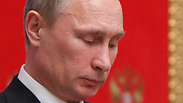
Putin exercising caution in Ukraine crisis
Analysis: While sending paratroopers to Crimea, Russian president is working to calm West, stress legitimacy of his moves.
The long history, therefore, is not in Ukraine's favor. Neither is the short history: The previous democratic revolution, the "orange" one of 2005, ended with frustration and mutual betrayals by men and women politicians. The Kremlin began stirring the pot of the party battles in Kiev, shamelessly agitating and poisoning.
But the Kremlin of 2014 is not the Kremlin of 2005. Russia has become much weaker, economically and strategically. The period of fast growth, which characterized the Russian economy in 2005, has ended. The revenues from the expensive oil were not invested in developing the economy, and were mostly wasted on worthless ostentatious projects and robbed by the Putin government and its associates.
Upon the drop in oil and gas prices, the Russian government's budget moved from surpluses to deficits, and so did the international balance of trade. Foreign investors realized that they were unwanted in Russia and stopped investing. The local ones did the same.
This was joined by domestic trouble. One of these problems is called "Sochi." Putin spent tens of millions of dollars on the Sochi Winter Olympics from the government coffers that are emptying out. There was no return, neither for the economy nor for positive publicity. The money went down the drain.
The second problem is called "military technology." The Russian leadership is concerned about the absolute American priority in this field and is now allocating huge resources to the security budget. These are resources which could have served the civil Russian economy.
Russian army lagging behind
Russia's global situation is bad. It is only pretending to be a world power: Its influence in the world is declining. Apart from a veto in the Security Council, it has nothing to offer its friends. The Russian military is not only lagging in technology, at least two generations behind the US Army, it also lacks war experience. In the past decade the Russian army, with its 400,000 soldiers, has devoted itself to brutal physical training, nurtured hierarchical discipline suitable for the previous century, and forgot to invest in the future battlefield.
Despite its quantitative advantage, the Russian army failed to overpower groups of armed civilians in the "Georgia war." The war ended with Russia annexing two tiny districts on its border with Georgia. More of a headache than an accomplishment.
Putin knows that and is therefore exercising caution in his attitude towards the Ukrainian crisis. In response to army leaders' pressure and with a quick approval of the obedient parliament, he is willing to send paratroopers to put on an appearance in the pro-Russian autonomy in the Crimea peninsula, which is formally controlled from Kiev. And at the same time he is speaking to Western leaders, calming and stressing the legitimacy of his moves: After all, Russia has a military bases agreement in the Black Sea ports.
Crimea itself was cut off from Russia and annexed to Ukraine only in 1954, during the days of the government of Ukrainian Nikita Khrushchev. The relations with the central government are tense: The Russian majority in Crimea strives for independence, the Ukrainians prefer a status-quo and the anti-Russian Tatar minority (12% of Crimea's population) threatens to use arms. The situation is always explosive.
The Ukrainian people have had strong nationalist feelings for hundreds of years; sometimes they took radical, fascist and anti-Semitic forms. The heroes of the Ukrainian national ethos are engraved in the historical consciousness of the Jewish people as the leaders of the murderous pogroms, from Khmelnytsky to Bandera. But the accusations of ousted President Yanukovych (from his shelter-hiding place in Russia, where he is an unwanted guest) as if the civil disobedience in Kiev was led by "national-fascist terror gangs" are baseless. Hundreds of thousands of good bourgeois citizens from the middle class protested at independence Square.
They went out to demand democracy, rule of law, freedoms for citizens and membership in the European Union. And they were willing to get killed for it. Far from fascism.
They will not give up. The chances that the current democratic-national-sovereign round will succeed are uncertain but are better than ever before. Even without the full control of Crimea.










